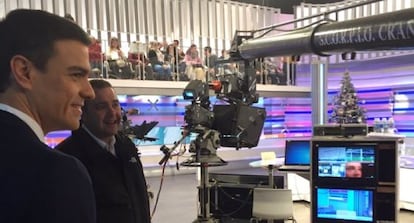Candidates swap party rallies for TV shows in search of mass audiences
Election campaign is focusing on the small screen, at the cost of major events

The campaign for the general election has swapped traditional political rallies for television appearances, preferably on entertainment shows.
Aides to the main candidates admit that they are trying to tap into a massive audience that can only be reached via television, with the reaction on social media later amplifying the impact of TV appearances.
Never before has a Spanish election race been so focused on the small screen. The change is part of a larger shift in which the top-down method of campaigning has been mostly abandoned for a more interactive relationship with potential voters.
Spaniards have a newfound interest in political talk shows since the crisis
This reflects the fact that three of the four main nominees to La Moncloa prime ministerial palace are in their late 30s and early 40s, and well-versed in the use of online tools. The emerging parties Podemos and Ciudadanos, in particular, owe much of their spectacular growth to social media.
In fact, these elections are being viewed practically as a generational battle between the old and the new. Communications experts now talk about “the new politics,” about “entertainment politics” and even about “pop campaigns” to explain this new effort to reach out to voters.
A study by Kantar, the world leader in market analysis, shows that 53.8 percent of Spaniards report following politics mostly on TV, followed by digital media for 21.9 percent.
These figures validate parties’ efforts to focus on television as the key battleground for votes, in an election with more undecided voters than ever before and surveys that show the Popular Party (PP), Socialists, Podemos and Ciudadanos running neck and neck in all the major cities.
The conservative PP is particularly interested in having a television presence, as many older voters still favor this medium over any other. PP sources said that their new strategy is based on humanizing their candidate in an effort to close the gap he has created with citizens during most of his term in office.
Prime Minister Mariano Rajoy, who at age 60 represents an earlier generation of Spanish politicians, will thus walk out of the Cabinet meeting this Friday to appear on ¡Qué tiempo tan feliz!, a light-entertainment program hosted by the popular presenter María Teresa Campos on the private network Telecinco.
Before this, Rajoy acted as a sports commentator for a recent soccer match, and refused to participate in a multi-candidate election debate organized by EL PAÍS. He was also seen on a show hosted by Bertín Osborne, a mainstream singer, actor and TV host.
At first, the PP had refused to take part in these shows, according to television executives. But last summer, Rajoy asked his top aides to make more television appearances to explain the government’s policies, and he also appointed more TV-savvy staff to key positions.
The Socialist nominee, Pedro Sánchez, made an unprecedented appearance last year on an afternoon gossip show called Sálvame
But Rajoy is not the only contender to be a guest on such shows. All the other main candidates have also been on the Campos show and on the Ana Rosa show, a popular gossip program. And all of them have participated in sports programs as well.
Óscar López, a leading member of the Socialist Party’s campaign team, says that the rise of the new parties is not just tied to the economic crisis but also to television. Spaniards have a newfound interest in political talk shows, he notes.
The Socialist nominee, Pedro Sánchez, made an unprecedented appearance last year on an afternoon gossip show called Sálvame in order to get viewers familiar with his face, at a time when he was the mostly unknown new party secretary.
Meanwhile, Ciudadanos’ Albert Rivera and Podemos’ Pablo Iglesias are well-versed in television appearances. The latter, in particular, has a long history of participation in political debate programs, which made his face familiar to audiences even before he ran in the European elections of May 2014.
English version by Susana Urra.
Tu suscripción se está usando en otro dispositivo
¿Quieres añadir otro usuario a tu suscripción?
Si continúas leyendo en este dispositivo, no se podrá leer en el otro.
FlechaTu suscripción se está usando en otro dispositivo y solo puedes acceder a EL PAÍS desde un dispositivo a la vez.
Si quieres compartir tu cuenta, cambia tu suscripción a la modalidad Premium, así podrás añadir otro usuario. Cada uno accederá con su propia cuenta de email, lo que os permitirá personalizar vuestra experiencia en EL PAÍS.
En el caso de no saber quién está usando tu cuenta, te recomendamos cambiar tu contraseña aquí.
Si decides continuar compartiendo tu cuenta, este mensaje se mostrará en tu dispositivo y en el de la otra persona que está usando tu cuenta de forma indefinida, afectando a tu experiencia de lectura. Puedes consultar aquí los términos y condiciones de la suscripción digital.








































